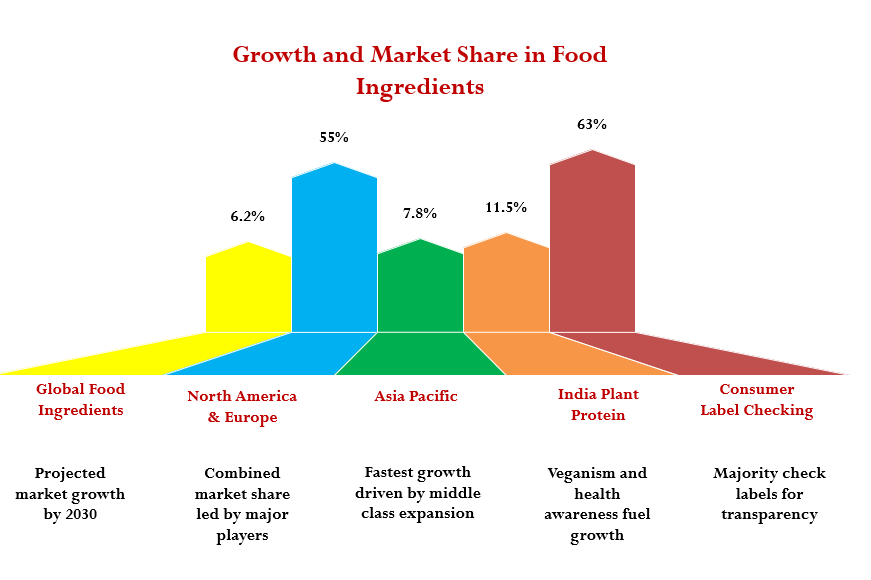|
|
|
You can get e-magazine links on WhatsApp. Click here
|
|
|
|
|
|
Ingredients industry stands at transformative crossroads
|
|
Thursday, 20 November, 2025, 16 : 00 PM [IST]
|
|
Dr K Anitha
|
 Food ingredients industry- Future prospects Food ingredients industry- Future prospects
The food ingredients industry, a cornerstone of the global food supply chain, is currently experiencing a significant transformation. Increasing consumer awareness of nutrition, sustainability, and food safety has prompted ingredient manufacturers to adopt science-based innovations and advanced technologies. According to Fortune Business Insights (2025), the global food ingredients market is expected to reach US$510 billion by 2030, growing at a compound annual growth rate (CAGR) of 6.2% between 2024 and 2030. This steady growth being driven by multiple converging trends including the rising popularity of functional foods, demand for clean label products, the shift toward plant-based proteins, and the integration of digital and sustainable practices within the food ecosystem.
The focus of food ingredients is no longer limited to taste and texture; it now extends to functionality, nutritional value, and environmental responsibility. The evolution of food ingredients has been remarkable. It began with simple, natural additives such as salt, honey, and spices, used primarily for preservation and flavour enhancement. The Industrial Revolution in the 19th century marked a major turning point, introducing chemical preservatives and synthetic colorants that enabled large scale food production and extended shelf life.

By the late 20th century, advancements in biotechnology brought about the use of enzymes, hydrocolloids, and emulsifiers, significantly improving the quality, stability, and sensory properties of foods.
As of 2025, North America and Europe hold a combined 55% market share in the food ingredients sector, led by giants like Cargill, DSM Firmenich, ADM, and Kerry Group. However, the Asia Pacific region is witnessing the fastest growth, with a CAGR of 7.8%, driven by expanding middle class populations in India, China, and Southeast Asia.
Key Growth Drivers
Modern consumers increasingly associate food with overall health and wellbeing, leading to a surge in demand for functional and nutritionally enhanced ingredients. Ingredients such as probiotics, omega-3 fatty acids, bioactive peptides, and plant derived proteins dominate this expanding sector. A significant development in this space is the integration of nutraceutical compounds into everyday food formulations. Bioactive ingredients like curcumin, ashwagandha extract, and beta-glucans are being incorporated into beverages, snacks, and fortified products due to their proven roles in supporting immunity, reducing inflammation, and enhancing vitality. Another major trend is the emphasis on gut health, driven by growing awareness of the microbiome’s role in overall health. Functional prebiotics, such as inulin and fructo-oligosaccharides, along with emerging postbiotics, are gaining popularity for their ability to promote digestive wellness and immune support. Furthermore, the concept of personalised nutrition is revolutionising the way ingredients are developed and marketed. Advances in nutrigenomics and DNA based dietary analysis are enabling customised food solutions designed to meet individual health needs.
Sustainability and Ethical Sourcing
Sustainability has evolved from a marketing claim into a central driver of innovation and growth in the food ingredients industry. According to the European Food Ingredients Sustainability Index (2024), approximately 78% of ingredient manufacturers have implemented sustainable sourcing frameworks aimed at reducing environmental impact and ensuring ethical supply chains. The industry is transitioning toward carbon-neutral production, renewable energy use, and the upcycling of agricultural waste into value added ingredients.
A noteworthy example is Upcycled Foods Inc., which transforms barley by products from breweries into high protein flour a practice that simultaneously reduces waste and enhances food resource efficiency. Similarly, the development of alternative oils derived from algae and insect-based proteins is helping to lower dependence on land and water intensive crops while maintaining nutritional quality. These innovations align with global climate goals and reflect the industry’s growing commitment to sustainable transformation.
Digitalisation and Smart Manufacturing
The integration of Industry 4.0 technologies is revolutionising the food ingredient manufacturing landscape by enhancing efficiency, transparency, and quality control. Artificial intelligence (AI), the Internet of Things (IoT), and block chain technologies are being increasingly adopted to streamline processes from formulation to distribution. AI driven formulation enables precise optimisation of ingredient combinations, improving product consistency and reducing experimental waste. Similarly, IoT enabled supply chains provide real time monitoring of ingredient quality, while blockchain systems, used by some companies ensure complete traceability from source to shelf thereby strengthening consumer trust.
Moreover, automation technologies supported by predictive analytics are improving fermentation processes, enzyme production, and overall resource management. According to the World Economic Forum (2025), the ongoing digital transformation in the food ingredients industry could reduce production costs by 15–25% over the next five years. This technological shift is not only improving profitability but also paving the way for a more transparent, data driven, and sustainable food ecosystem.
Emerging Trends and Technologies
Consumers today seek simple, natural, and transparent ingredients. According to Innova Market Insights (2025), 63% of global consumers check ingredient labels before purchase. As a result, natural substitutes such as beetroot for colour, and rosemary or green tea extracts as antioxidants, are replacing synthetic additives. Microbial fermentation increasingly used to produce natural flavours, while enzymatic processing is replacing chemicals in dough conditioning and sweetness modulation, ensuring cleaner and more sustainable food production.
Plant Based and Alternative Proteins
The plant-based ingredients market, valued at US$29 billion in 2024 is projected to exceed US$50 billion by 2030. Innovations in pea, mung bean, chickpea, and mycoprotein ingredients are driving this growth. Cellular agriculture and precision fermentation now enable production of animal-free proteins like casein, collagen, and whey, improving sustainability and allergen safety. In India, the plant protein market is growing at 11.5% CAGR, fuelled by veganism and rising health awareness. Post-pandemic, consumers are focusing on mental and immune health. Ingredients like L-theanine, GABA, Bacopa monnieri, and nutrients such as vitamin D3, zinc, and echinacea are in high demand. The cognitive health ingredients market is expected to reach US$12 billion by 2030 (Allied Market Research, 2025). However, improving the stability and bioavailability of these active compounds remains a major research challenge.
Future Prospects: Food Ingredients Industry
The food ingredients industry stands at a transformative crossroads where science meets sustainability, technology meets tradition, and consumer demand meets ethical innovation. By embracing digitalisation, biotechnology, and circular economy models, the industry is poised to create a resilient and healthier global food future. In the coming decade, success will depend not only on product innovation but also on the values embedded in every ingredient transparency, sustainability, and human well-being. The future of food ingredients is not just, about what we eat, but how responsibly and intelligently we produce it.
(The author is assistant professor, Department of Pharmacology, School of Pharmacy and Technology Management (SPTM), SVKM's Narsee Monjee Institute of Management Studies (NMIMS) Deemed-to-be-University, Shirpur)
|
|
|
|
|
|
|
|
|
|